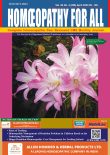Globalizing Homeopathic Education: Convergence with WHO-GTM Strategy 2025-2034
Keywords:
World Health Organization (WHO), traditional, medicine, GlobalAbstract
The WHO Global Traditional Medicine (GTM) Strategy 2025–2034 emphasizes the need for culturally sensitive, regulated education across Traditional Medicine systems, including homoeopathy. Despite its global presence in over 100 countries, homoeopathy lacks consistent educational standards, underscoring the urgency for internationally aligned benchmarks. This paper advocates for the establishment of global educational guidelines to enhance quality, regulatory integration, and clinical credibility. It further proposes an interdisciplinary curriculum blending Hahnemannian philosophy with knowledge from Ayurveda, Yoga, Anthroposophy, and Naturopathy, along with nutrition and mind–body therapies. Active engagement of member states is essential to embed homoeopathy in health policies and academic dialogues. Emphasizing sustainability and local relevance, the paper highlights the need to align homoeopathic education with ecological, cultural, and biomedical realities. Finally, it positions India to take global leadership through innovation, collaboration, and academic excellence in homoeopathy.
Downloads
References
WHO. (2025). Draft global traditional medicine strategy (2025–2034). Available at: https://apps.who.int/gb/ebwha/pdf_files/WHA78/A78_4Add1-en.pdf [Accessed 25 June 2025].
WHO. (2019). WHO global report on traditional and complementary medicine 2019. Available at: https://www.who.int/publications/i/item/978924151536 [Accessed 27 June 2025].
Chand Diwan, H. (1967). A Compendium of Lectures on Homoeopathy. Presidential address at the International Homoeopathic Congress of LMHI.
Manchanda, R. K., Anupriya, Pandey, S., & Agaoglu, A. (2024). Modernization and Standardization of Homoeopathic Education Globally: A LMHI Initiative. Homeopathy for All, 26(7), 292. ISSN: 0973-9823.
Manchanda, R. K., Anupriya, & Pandey, S. (2021). Homeopathic Medical Education: Ensuring Quality Standards Globally. Homeopathy for All, November 2021.
WHO. (n.d.). Training of trainers manual on traditional and complementary medicine. Available at: https://iris.who.int/bitstream/handle/10665/366645/9789240067431-eng.pdf
WHO. (n.d.). Benchmarks for training in traditional medicine. Available at: https://www.who.int/publications/i/item/9789240042711
WHO. (n.d.). Benchmarks for training in Unani medicine. Available at: https://www.who.int/publications/i/item/9789240042735
WHO. (n.d.). Benchmarks for training in Ayurveda. Available at: https://www.who.int/publications/i/item/9789241599658
WHO. (n.d.). WHO global report on health systems and policies. Available at: https://www.who.int/publications/i/item/9789240017962
WHO. (n.d.). WHO Traditional Medicine Strategy 2014–2023. Available at: https://iris.who.int/handle/10665/44353
WHO. (n.d.). Benchmarks for training in traditional Chinese medicine. Available at: https://www.who.int/publications/i/item/9789241599665
WHO. (n.d.). Training benchmarks: Traditional Chinese internal medicine. Available at: https://iris.who.int/bitstream/handle/10665/44358/9789241599689_eng.pdf
Manchanda, R. K., Anupriya, & Arora, I. (2023). It is Time for Indian Schools to Innovate, Invest and Disseminate Homoeopathic Education Globally. Homeopathy for All, July 2023.




